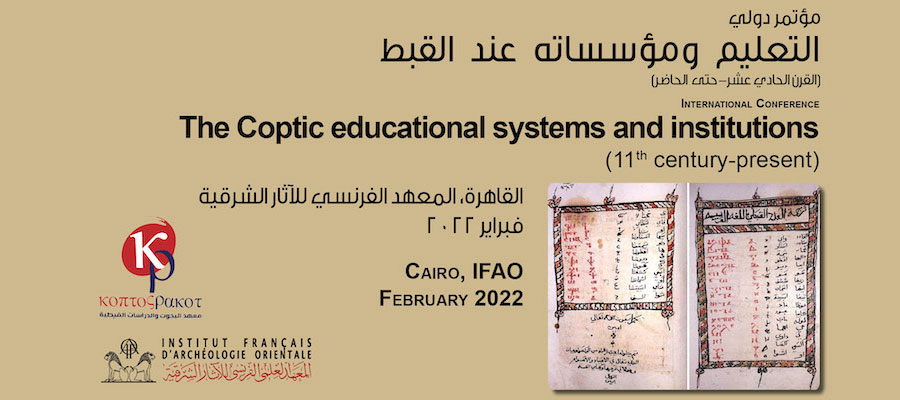Coptic Educational Systems and Institutions (11th Century - Present), French Institute for Oriental Archaeology (IFAO), Cairo, February 17–18, 2022
The French Institute for Oriental Archaeology (IFAO), in cooperation with Center of Coptic Studies at the Faculty of Arts, Alexandria University, is hosting an international conference entitled "The Coptic Educational Systems and Institutions (11th Century - Present) on February 17 and 18, 2022, at The Institute’s premises in Cairo
Context and Themes
When it comes to the history of education among Copts in the Arab era, there are two important phases: the first is the period extending from the late tenth century to the middle of the fourteenth century, which witnessed the flooding of writings in religious, legal, theological, and liturgical aspects, as well as many philosophical and ideological debates and discussions. This momentum could indicate a reasonable environment for teaching and learning, which most of its features, methods, and institutions are not yet known. The second is the period that begins from the middle of the nineteenth century and onwards, with initiatives of educational projects and the establishment of schools for civilians and clergy, in addition to the Western missionaries that founded schools and educational institutions across the country. In between, the period spans from the middle of 14th century to the middle of 19th century especially the Ottoman period (1517-1805) is completely neglected, and has been stigmatized as the period of backwardness, darkness and ignorance.
However, restricting Coptic education to religious matters in the medieval and pre-modern history, and to confessional schools in modern history has severely ignored other important aspects! Such as the financial and topographical knowledge, that the Copts were applying to achieve their functions in financial and administrative affairs. They had also certain engineering experiences required to achieve land surveying. Thus, it is of importance to explore and focus on these fields, and the ways of transferring knowledge. This point may allow a wide scope to study important aspects of Egyptian history. Hence, this approach is a way to study aspects of Coptic history in their broader contexts, or to study important aspects of Egyptian history from the point of view of professional and administrative knowledge.
Moreover, there is scattered information about the traditional educational institutions of the Copts, especially the schools attached to the churches. In comparison to the abundance of information about these institutions on the Islamic side, whether chronicles, biographies, or thousands of legal documents, especially waqf endowment documents, the sources are silent about these institutions on the Coptic side.
All these topics require further studies and analyses. Therefore, we invite researchers interested in the field, or related fields, to submit research papers on these issues. Please refer to the below list of suggested themes in which contributions can be made:
- Traditional Educational Coptic Institutions
- Between Islamic and Coptic Institutions: Sources and Approaches.
- Religious and Theological Debates: The Institutional Education Systems Could Be Behind.
- Ways of Transferring Religious and Liturgical Knowledge
- Manuscripts Traditions, Copying, Revising, Editing.
- Methods of Teaching Financial and Administrative Matters, Land Surveying, and Bookkeeping.
- Sources of Non-Religious Teaching.
- Modern and Missionary Schools
- Charitable Foundations and Their Educational Roles
- Current Educational and Research Centers.
Papers can be submitted in Arabic, French, or English.
